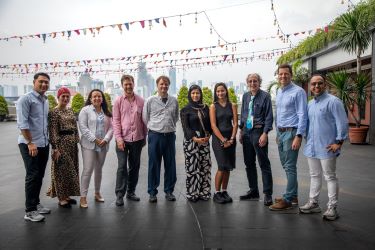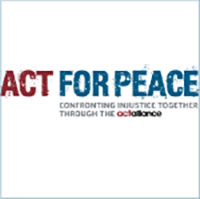Building a locally led approach, lawfully
Act for Peace is committed to amplifying the voices of people who are displaced as key to facilitating a truly locally led approach.
This Refugee Week, we celebrate a campaign to enshrine refugees’ right to participate in international law and policy reform.

Brian Barbour, Act for Peace Senior Refugee Protection Advisor, is currently working on this project, which is being led hand-in-hand with refugee-led organisations. The Asia Pacific Network of Refugees (APNOR), one of the co-leading partners in the current global working group on meaningful refugee participation, brings deep lived experience and grassroots leadership to the effort.
“Refugees don’t just need a seat at the table—we need to build our own table,” says Najeeba Wazefadost, a former refugee and Executive Director of APNOR. “We are no longer asking to be included—we are already leading.”
At the inaugural Global Refugee Forum (GRF) in 2019, governments, international institutions, private sector stakeholders, non-government organisations and refugees came together as part of a global action planning process. From this first GRF, Act for Peace, together with the Asia Pacific Network of Refugees (APNOR), the Asia Pacific Refugee Rights Network (APRRN), and the Global Refugee-Led Network (GRN) worked together to create pledges on the meaningful participation of refugees in decision-making.
Since then, over 50 stakeholders have committed to the pledge, including the Australian government as well as Canada, the US, the Netherlands, Germany and Denmark. The pledge has very tangible outcomes. Australia now has a Refugee Advisory Committee made up of refugees who advise the government on policies and programs.
But in order for this pledge to have concrete outcomes, the progress needs to be cemented within a legal framework.
In response, a global working group was established, co-led by Act for Peace, the Asia Pacific Network of Refugees (APNOR) and the Kaldor Centre for International Refugee Law at the University of New South Wales. This team of 12 refugee leaders and eight academic/legal experts has developed a consultation draft of a declaration on refugees’ rights to meaningful participation.
The working group has finalised a ‘consultation draft’, which is now out for global consultation at the end of June. The group then hopes to work alongside UNHCR to develop an Executive Committee Conclusion on Meaningful Participation. This would be the start of law reform at the global level. Simultaneously, efforts will be made at the regional, national, and local levels in many contexts around the globe, making sure that refugees have a right to participate in all the decisions and programs that affect them.
According to Brian, there is universal agreement on refugees’ rights to participate in theory, but the declaration is an important step to ensuring those rights are respected in practice.
“What we want to do is move from rhetoric to rights. Everyone agrees that meaningful participation is important,” says Brian. “But those are just words. It doesn’t ensure that anything is going to happen in practice. What we want to do is to operationalise that. We want it to be implemented in practice.”
If the declaration is adopted, Brian hopes this will mean that refugees will have a seat at the table in decision-making contexts, be involved in service delivery, and part of all coordination bodies.
You can read the full article and Draft Declaration and share your feedback on the Act for Peace website.
Latest news on Global Forced Displacement
Key statistical trends on forced displacement, including the latest official global figures on refugees, internally displaced and stateless people. Global Forced Displacement now exceed 122 million.
Read: UNHCR – Global Trends Report | 12 June 2025

